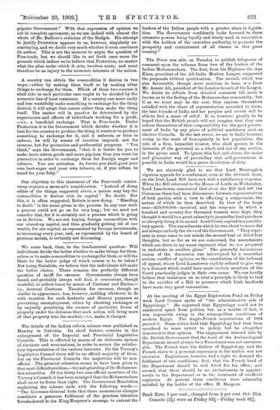A country can obtain the commodities it desires in two
ways,—either by making them itself or by making other things to exchange for them. Which of these two courses it shall take in each particular case ought to be decided by the economic line of least resistance. If a country can more easily and less wastefully make something to exchange for the thing desired, it will adopt that course rather than make the thing itself. The matter will in practice be determined by the experiments and efforts of individuals working for a profit„ --i.e., a beneficial exchange. That is Free-trade. Under Protection it is the Government which decides whether it is best for the country to produce the thing it wants or to produce something to exchange for it, and it enforces, or tries to eliforce, its will by means of taxation imposed, not for revenue, but for protective and preferential purposes. "You think," says the Government, "that it is better for you to make more cotton goods and more pig-iron than you want for yourselves in order to exchange them for foreign sugar and tobacco. You are mistaken. In future you shall grow your own beet-sugar and your own tobacco, or, if you refuse, be taxed for your folly."
























































 Previous page
Previous page